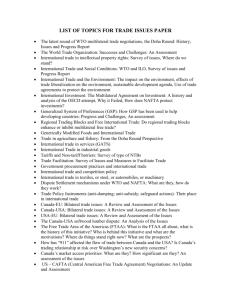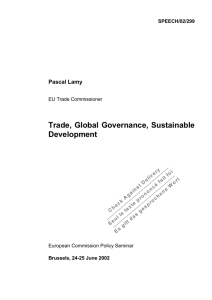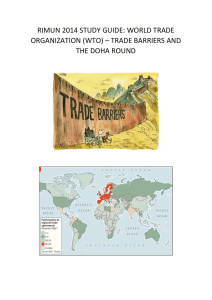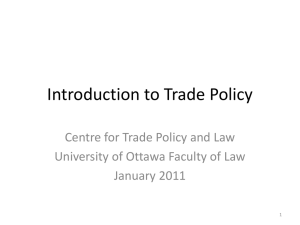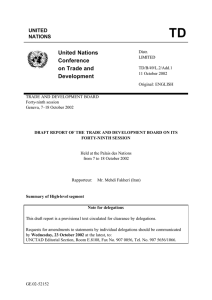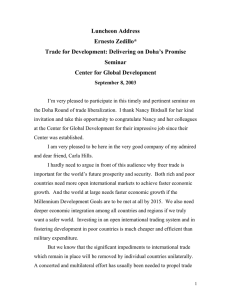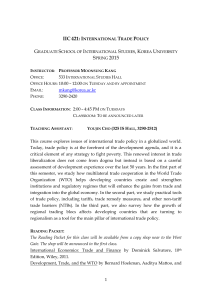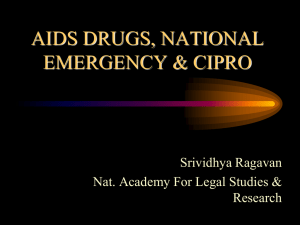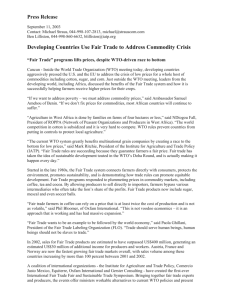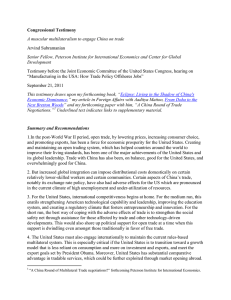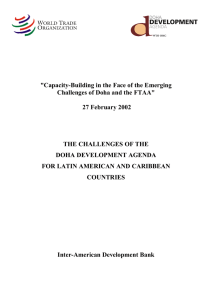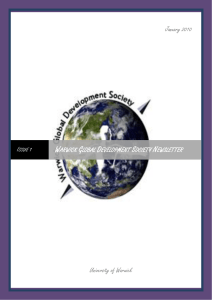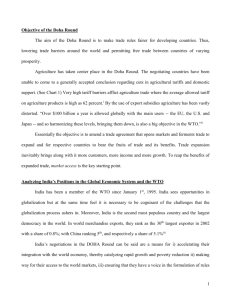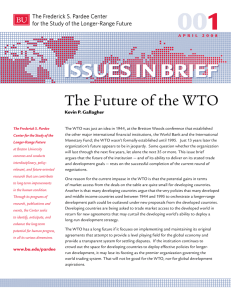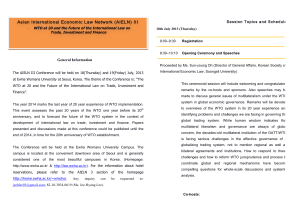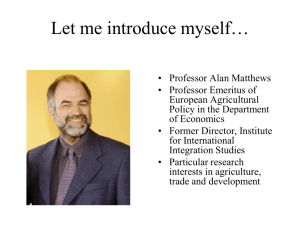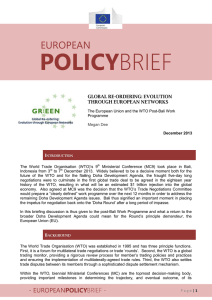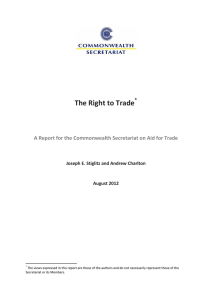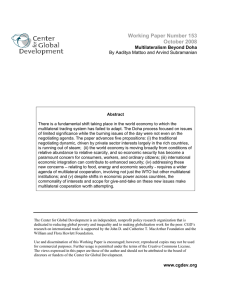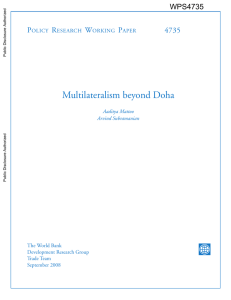DOC - Europa
advertisement
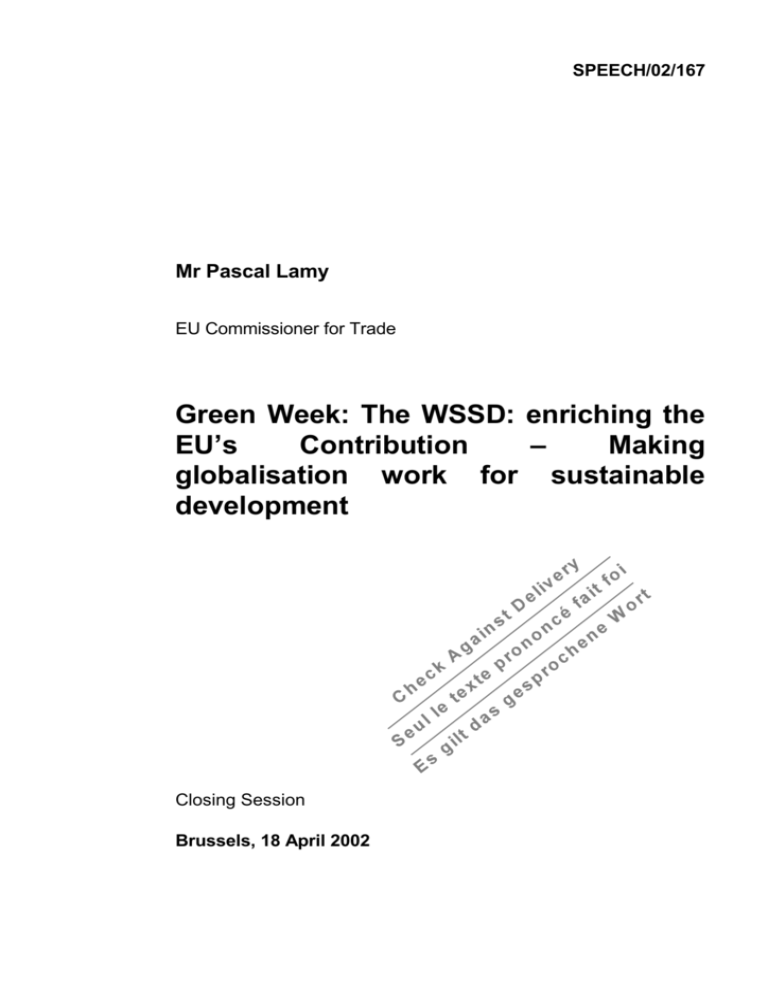
SPEECH/02/167 Mr Pascal Lamy EU Commissioner for Trade Green Week: The WSSD: enriching the EU’s Contribution – Making globalisation work for sustainable development Closing Session Brussels, 18 April 2002 The discussions you had today were under the heading of "Making globalisation work for sustainable development". This is one of the key priorities for the EU's sustainable development strategy. Let me briefly set out how I see the key challenge and what role trade can play in this respect. The point of departure is simple: The present state of the world division of labour is neither equitable nor sustainable. In front of such a predicament, there are two options : - Either going on with the present demographic, economic, social and ecological imbalances. This is the road towards confrontation. And for those who implicitly accept such a risk, the only way out is a security approach based on strategic hegemony This is not an option for Europe : it does not fit in with our values - and anyway, it would be beyond our reach. - Or building up a multilateral and multipolar system of global governance aimed at sustainable development for the whole planet. The task assigned to such a system should be two-fold - firstly, real convergence of GDP/head between North-South, but subject to - secondly, increasing environmental disciplines which of course have to start here in the North. Such a sustainable development approach is the only way consistent with the EU model – although this concept remains pretty blurred or is even getting a bit elusive – and with EU long term interest. It is a course of co-operation, of peace and of prosperity. This is the global partnership we have to achieve in Johannesburg. Johannesburg is a priority for the Prodi Commission. The fact that you have three Commissioners present here is testimony to the importance we attach to making the WSSD a success. It is also an indication about the horizontal nature of the SD challenge: SD is not something you can neatly put into boxes (economic, social, environmental), and then each Commissioner (or Minister) goes away and deals with his or her box in their respective corners - no, we need to address the interlinkages between the three main pillars of SD and this is in fact a task for the whole College [which incidentally explains why it might have taken a bit longer than some of you - and us - would have wished for the COM Communication for Jo'burg to see the light of day]. Putting the globe on a sustainable development path requires commitments from all parties, in the field of trade, finance and norms and standards: - The developed world has a key role and must deliver by fully implementing the Doha Development Agenda agreed last November, in terms of market access, development-oriented trade rules and technical assistance. We must also deliver in terms of public and private financing (follow up of Monterrey) and innovative approaches to environmental, health and consumer protection, including incentives for environmentally and socially sustainable production and trade. 2 - Internal policies in the developing world will need to be developed to ensure that the domestic policies support a sustainable approach to development. Domestic policies are key. Not only those related to integration with the global economy, but also domestic policies which may, in fact, be a prerequisite for successful integration. These include sound macro-economic policies, rule of law and social policies. - And, of course, all countries must become more committed to a more responsible use and protection of natural resources. Developed countries have a respeonsibility here to lead by example and to assist developing countries in their efforts. - On a global level, governance needs to be improved and developing countries need to be more effectively involved in decision-making processes. The contribution of the international institutions is a prerequisite for progress. The Bretton Woods Institutions, the WTO and the UN system in their norm-setting and aid-providing roles need to work towards the strategic goal of sustainable development. It will not surprise you that as Trade Commissioner, I would like to dwell a bit longer on the contribution trade can make to SD - and under what conditions. I am of course fully aware that trade is only part of the picture, but I would argue it's an important one. I see the World Trade Organisation as the commercial pillar of global governance, with finance as another and the set of rules and co-operation schemes which deal with social development and environment protection as a third one. And global governance is about coherence between the three pillars : Doha - Monterrey - Johannesburg ! Trade liberalisation without financial assistance and without multilateral, social and environmental norms would neither achieve North-South convergence, nor sustainable management of natural resources. Trade is not an end in itself, but a means to an end - it can be a very powerful tool for development if we get the conditions right. The agreement of WTO members to launch a new round of trade liberalisation and rule-making in Doha has created a golden opportunity to achieve more sustainable development. The aim of DDA is to ensure substantially greater market access for developing countries, both to developed markets and between themselves, together with a rules-based framework to maximise the positive impacts of trade and minimise the negative ones. Talks on a wide range of issues such as competition, investment and trade facilitation will ensure that market liberalisation takes place in a broader regulatory framework. In the absence of such rules, free-riders or monopolies will lead the process of globalsiation. The inclusion of environment on the international trade agenda through the DDA is also groundbreaking from a sustainable development perspective and provides an instrument for improved global governance. Marrakech (on the Kyoto Protocol), Doha and Monterrey provide a solid basis for significant outcomes in the WSSD. The WSSD is an essential rendez-vous that should pull the various strands together and provide international organisations and governments with a roadmap for the next decade. 3 In the trade area, WSSD can contribute by identifying a positive agenda for trade. The objective is twofold: to promote and support the successful implementation of the DDA and to agree concrete and operational measures outside the scope of Doha negotiations which stimulate environmentally and socially sustainable production and trade. I hope that we can convince our partners to work towards such a positive message at the Summit. In this context, I should like to say that I very much welcome appeals such as the one launched by Friends of the Earth, Greenpeace, WWF, Third World Network and others that call on Jo'burg to push for WTO members to deliver on their commitment to clarify the relationship between the WTO and Multilateral Environmental Agreements - and this in a way that does not subordinate MEAs to WTO rules. This is indeed an essential question of coherence in global governance, and pressure from civil society in this repect can be helpful both in our EU-internal discussions and in our contacts with WTO partners. The EU has already done a lot outside the scope of DDA: - Everything But Arms - complete tariff and quota free market access for all products except arms from 49 least developed countries - other developed countries should do the same - The GSP scheme which has been improved for all developing countries, also non LDC countries, with increased preferences for those countries taking into account social and environmental concerns. - Sustainability Impact Assessment, SIA: The Commission will use the SIAs in all trade its negotiations, both multilateral and regional agreements. In addition, the Commission is working on several ideas for this positive trade agenda for the World Summit, both on measures that should be undertaken by governments (in World Summit “new speak”, type 1 initiatives), and measures that can be undertaken in partnership with NGOs or the private sector, type 2 initiatives. We are working with type 1 ideas ranging from finding ways to facilitate the use of environmental technologies in developing countries, to supporting and stimulating fair trade and organic produce. We are working with ideas for type 2 initiatives with NGOs such as the support for a sustainable trade centre, aimed at facilitating exports from developing countries, support for the promotion and wider use of sustainability impact assessments in developing countries, and for the protection of natural resources, eg. combatting trade in products resulting from illegal logging. The agreement to launch a new development agenda in Doha was a major step towards sustainable development. The EU was a united and steadfast leader in this process which shows that the EU can achieve significant outcomes on a global level provided that it works consistently and pursues a clear and unambiguous agenda. This is also the lesson from Marrakech and Monterrey: United, we can make a difference. It's a formidable challenge - but I am confident that we can tackle it. 4
